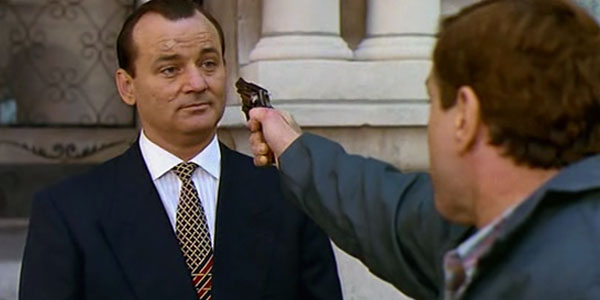3. Mad Dog And Glory (1993)

Universal Studios
Frank Milo: Woman, you cant live with them and you cant kill em. To say the set-up of Mad Dog and Glory is contrived is an understatement. When a timid crime scene photographer saves the life of a mobster who moonlights as a stand-up comedian, he is rewarded with a beautiful young woman. Alongside Murray is Robert De Niro, three years removed from Goodfellas, but in a subversion of what you may be thinking, it is Murray who plays the mobster and De Niro who plays the photographer. How director John McNaughton would want to take credit for this genius casting, but it was actually at De Niros insistence that he didnt play the mobster, opening up the role that would go on to change Bill Murrays career trajectory over the last twenty years. Many cite Rushmore as Murrays renaissance as the darkly comic supporting character, but this was the film that Wes Anderson cites as being the reason he cast Murray in Rushmore. That the film generally received mixed reviews from the public (currently only holding 6.2 on the IMDb) but has garnered great reception from respected critics says a lot particularly given that it is foremost a comedy, where the public tends to be more forgiving. The late, great Roger Ebert wrote that the people who made it must have come to know the characters very well, because although they seem to fit into broad outlines, they are real individuals. However, it is Vincent Canby, writing in the New York Times, who hit the nail on the head: The great satisfaction of Mad Dog and Glory is watching Mr De Niro and Mr Murray play against type with such invigorating ease.
 Universal StudiosFrank Milo: Woman, you cant live with them and you cant kill em. To say the set-up of Mad Dog and Glory is contrived is an understatement. When a timid crime scene photographer saves the life of a mobster who moonlights as a stand-up comedian, he is rewarded with a beautiful young woman. Alongside Murray is Robert De Niro, three years removed from Goodfellas, but in a subversion of what you may be thinking, it is Murray who plays the mobster and De Niro who plays the photographer. How director John McNaughton would want to take credit for this genius casting, but it was actually at De Niros insistence that he didnt play the mobster, opening up the role that would go on to change Bill Murrays career trajectory over the last twenty years. Many cite Rushmore as Murrays renaissance as the darkly comic supporting character, but this was the film that Wes Anderson cites as being the reason he cast Murray in Rushmore. That the film generally received mixed reviews from the public (currently only holding 6.2 on the IMDb) but has garnered great reception from respected critics says a lot particularly given that it is foremost a comedy, where the public tends to be more forgiving. The late, great Roger Ebert wrote that the people who made it must have come to know the characters very well, because although they seem to fit into broad outlines, they are real individuals. However, it is Vincent Canby, writing in the New York Times, who hit the nail on the head: The great satisfaction of Mad Dog and Glory is watching Mr De Niro and Mr Murray play against type with such invigorating ease.
Universal StudiosFrank Milo: Woman, you cant live with them and you cant kill em. To say the set-up of Mad Dog and Glory is contrived is an understatement. When a timid crime scene photographer saves the life of a mobster who moonlights as a stand-up comedian, he is rewarded with a beautiful young woman. Alongside Murray is Robert De Niro, three years removed from Goodfellas, but in a subversion of what you may be thinking, it is Murray who plays the mobster and De Niro who plays the photographer. How director John McNaughton would want to take credit for this genius casting, but it was actually at De Niros insistence that he didnt play the mobster, opening up the role that would go on to change Bill Murrays career trajectory over the last twenty years. Many cite Rushmore as Murrays renaissance as the darkly comic supporting character, but this was the film that Wes Anderson cites as being the reason he cast Murray in Rushmore. That the film generally received mixed reviews from the public (currently only holding 6.2 on the IMDb) but has garnered great reception from respected critics says a lot particularly given that it is foremost a comedy, where the public tends to be more forgiving. The late, great Roger Ebert wrote that the people who made it must have come to know the characters very well, because although they seem to fit into broad outlines, they are real individuals. However, it is Vincent Canby, writing in the New York Times, who hit the nail on the head: The great satisfaction of Mad Dog and Glory is watching Mr De Niro and Mr Murray play against type with such invigorating ease.